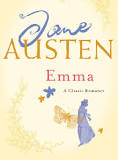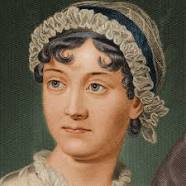Emma Page #31
Emma, by Jane Austen, is a novel about youthful hubris and the perils of misconstrued romance. The story takes place in the fictional village of Highbury and the surrounding estates of Hartfield, Randalls, and Donwell Abbey and involves the relationships among individuals in those locations consisting of "3 or 4 families in a country village". The novel was first published in December 1815 while the author was alive, with its title page listing a publication date of 1816. As in her other novels, Austen explores the concerns and difficulties of genteel women living in Georgian–Regency England; she also creates a lively comedy of manners among her characters and depicts issues of marriage, gender, age, and social status.
Now, it so happened that in spite of Emma's resolution of never marrying, there was something in the name, in the idea of Mr. Frank Churchill, which always interested her. She had frequently thought--especially since his father's marriage with Miss Taylor--that if she were to marry, he was the very person to suit her in age, character and condition. He seemed by this connexion between the families, quite to belong to her. She could not but suppose it to be a match that every body who knew them must think of. That Mr. and Mrs. Weston did think of it, she was very strongly persuaded; and though not meaning to be induced by him, or by any body else, to give up a situation which she believed more replete with good than any she could change it for, she had a great curiosity to see him, a decided intention of finding him pleasant, of being liked by him to a certain degree, and a sort of pleasure in the idea of their being coupled in their friends' imaginations. With such sensations, Mr. Elton's civilities were dreadfully ill-timed; but she had the comfort of appearing very polite, while feeling very cross--and of thinking that the rest of the visit could not possibly pass without bringing forward the same information again, or the substance of it, from the open-hearted Mr. Weston.--So it proved;--for when happily released from Mr. Elton, and seated by Mr. Weston, at dinner, he made use of the very first interval in the cares of hospitality, the very first leisure from the saddle of mutton, to say to her, “We want only two more to be just the right number. I should like to see two more here,--your pretty little friend, Miss Smith, and my son--and then I should say we were quite complete. I believe you did not hear me telling the others in the drawing-room that we are expecting Frank. I had a letter from him this morning, and he will be with us within a fortnight.” Emma spoke with a very proper degree of pleasure; and fully assented to his proposition of Mr. Frank Churchill and Miss Smith making their party quite complete. “He has been wanting to come to us,” continued Mr. Weston, “ever since September: every letter has been full of it; but he cannot command his own time. He has those to please who must be pleased, and who (between ourselves) are sometimes to be pleased only by a good many sacrifices. But now I have no doubt of seeing him here about the second week in January.” “What a very great pleasure it will be to you! and Mrs. Weston is so anxious to be acquainted with him, that she must be almost as happy as yourself.” “Yes, she would be, but that she thinks there will be another put-off. She does not depend upon his coming so much as I do: but she does not know the parties so well as I do. The case, you see, is--(but this is quite between ourselves: I did not mention a syllable of it in the other room. There are secrets in all families, you know)--The case is, that a party of friends are invited to pay a visit at Enscombe in January; and that Frank's coming depends upon their being put off. If they are not put off, he cannot stir. But I know they will, because it is a family that a certain lady, of some consequence, at Enscombe, has a particular dislike to: and though it is thought necessary to invite them once in two or three years, they always are put off when it comes to the point. I have not the smallest doubt of the issue. I am as confident of seeing Frank here before the middle of January, as I am of being here myself: but your good friend there (nodding towards the upper end of the table) has so few vagaries herself, and has been so little used to them at Hartfield, that she cannot calculate on their effects, as I have been long in the practice of doing.” “I am sorry there should be any thing like doubt in the case,” replied Emma; “but am disposed to side with you, Mr. Weston. If you think he will come, I shall think so too; for you know Enscombe.” “Yes--I have some right to that knowledge; though I have never been at the place in my life.--She is an odd woman!--But I never allow myself to speak ill of her, on Frank's account; for I do believe her to be very fond of him. I used to think she was not capable of being fond of any body, except herself: but she has always been kind to him (in her way--allowing for little whims and caprices, and expecting every thing to be as she likes). And it is no small credit, in my opinion, to him, that he should excite such an affection; for, though I would not say it to any body else, she has no more heart than a stone to people in general; and the devil of a temper.” Emma liked the subject so well, that she began upon it, to Mrs. Weston, very soon after their moving into the drawing-room: wishing her joy--yet observing, that she knew the first meeting must be rather alarming.-- Mrs. Weston agreed to it; but added, that she should be very glad to be secure of undergoing the anxiety of a first meeting at the time talked of: “for I cannot depend upon his coming. I cannot be so sanguine as Mr. Weston. I am very much afraid that it will all end in nothing. Mr. Weston, I dare say, has been telling you exactly how the matter stands?” “Yes--it seems to depend upon nothing but the ill-humour of Mrs. Churchill, which I imagine to be the most certain thing in the world.” “My Emma!” replied Mrs. Weston, smiling, “what is the certainty of caprice?” Then turning to Isabella, who had not been attending before--“You must know, my dear Mrs. Knightley, that we are by no means so sure of seeing Mr. Frank Churchill, in my opinion, as his father thinks. It depends entirely upon his aunt's spirits and pleasure; in short, upon her temper. To you--to my two daughters--I may venture on the truth. Mrs. Churchill rules at Enscombe, and is a very odd-tempered woman; and his coming now, depends upon her being willing to spare him.” “Oh, Mrs. Churchill; every body knows Mrs. Churchill,” replied Isabella: “and I am sure I never think of that poor young man without the greatest compassion. To be constantly living with an ill-tempered person, must be dreadful. It is what we happily have never known any thing of; but it must be a life of misery. What a blessing, that she never had any children! Poor little creatures, how unhappy she would have made them!” Emma wished she had been alone with Mrs. Weston. She should then have heard more: Mrs. Weston would speak to her, with a degree of unreserve which she would not hazard with Isabella; and, she really believed, would scarcely try to conceal any thing relative to the Churchills from her, excepting those views on the young man, of which her own imagination had already given her such instinctive knowledge. But at present there was nothing more to be said. Mr. Woodhouse very soon followed them into the drawing-room. To be sitting long after dinner, was a confinement that he could not endure. Neither wine nor conversation was any thing to him; and gladly did he move to those with whom he was always comfortable.
Translation
Translate and read this book in other languages:
Select another language:
- - Select -
- 简体中文 (Chinese - Simplified)
- 繁體中文 (Chinese - Traditional)
- Español (Spanish)
- Esperanto (Esperanto)
- 日本語 (Japanese)
- Português (Portuguese)
- Deutsch (German)
- العربية (Arabic)
- Français (French)
- Русский (Russian)
- ಕನ್ನಡ (Kannada)
- 한국어 (Korean)
- עברית (Hebrew)
- Gaeilge (Irish)
- Українська (Ukrainian)
- اردو (Urdu)
- Magyar (Hungarian)
- मानक हिन्दी (Hindi)
- Indonesia (Indonesian)
- Italiano (Italian)
- தமிழ் (Tamil)
- Türkçe (Turkish)
- తెలుగు (Telugu)
- ภาษาไทย (Thai)
- Tiếng Việt (Vietnamese)
- Čeština (Czech)
- Polski (Polish)
- Bahasa Indonesia (Indonesian)
- Românește (Romanian)
- Nederlands (Dutch)
- Ελληνικά (Greek)
- Latinum (Latin)
- Svenska (Swedish)
- Dansk (Danish)
- Suomi (Finnish)
- فارسی (Persian)
- ייִדיש (Yiddish)
- հայերեն (Armenian)
- Norsk (Norwegian)
- English (English)
Citation
Use the citation below to add this book to your bibliography:
Style:MLAChicagoAPA
"Emma Books." Literature.com. STANDS4 LLC, 2025. Web. 10 Jan. 2025. <https://www.literature.com/book/emma_29>.




Discuss this Emma book with the community:
Report Comment
We're doing our best to make sure our content is useful, accurate and safe.
If by any chance you spot an inappropriate comment while navigating through our website please use this form to let us know, and we'll take care of it shortly.
Attachment
You need to be logged in to favorite.
Log In